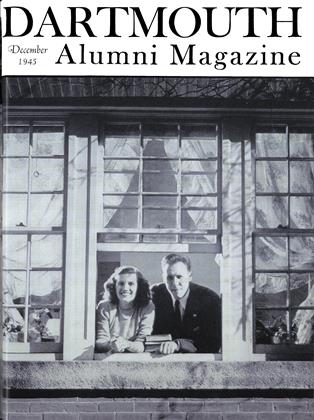One of the best remembered sayings of former President Hopkins during his long and fruitful administration at Dartmouth is that often quoted remark that "too many men are going to college." As usual, one needs the context to discover the real meaning. What it came to, as now recalled, was that too many men are going to college who ought not to go—and too few are going who ought to, in part because the surplus of ought-nots monopolizes the available space. At Dartmouth an attempt is made to restrict the student body to the men who, on the face of the record, have the capacity and the desire to get the most the College has to give, by excluding the obvious drones from the hive. In this attempt, by means of the so-called "selective process," a substantial success has been attained.
One of the midwestern universities is reputed to have made a postgraduate survey of its alumni with a view to ascertaining how much good a college education has done in its own case. Presumably the result will be the usual one, namely that there will be discovered the customary number of men in middle life who went through college without thereby acquiring anything outwardly distinctive to differentiate them from men of equal age who had not the same educational advantage. Every one knows the type; to wit, the man whom no one would suspect of collegiate connections from anything he does, or says, but whom the record avouches to be a Bachelor of Arts. Every college and every university has a plenitude of such. Despite the selective process, Dartmouth cannot deny her possession of a share. The question then arises, does it matter?
There is room for the contention that it does not. Granting that the colleges as a whole are bound to turn out considerable numbers of men with academic degrees of whom no one would suspect they had ever been to college unless they told you, is that fact as important as one might think? For many of us, the really important thing is not what stored-up learning we carry away from college, but what our four years in college inspires us to seek. During our residence we are exposed to beneficent in- fluences; and one idea—perhaps the main idea—is that these shall go on influencing. For it is a trite remark, common to all Commencement and Convocation speakers everywhere, that education is a lifelong process. What the colleges have to give is not a completed education, but a desire for education; not a stock of knowledge neatly catalogued and pigeon-holed in the little gray cells of the brain, but a capacity to think logically, to act cooperatively, and to live appreciatively in the world of men. A man may not be willing between the ages of 18 and 32 to take all the colleges have to offer him; but at least he knows it's there and is almost certain later on to seek it, to what extent he can. It may well be profitable to strive to make all students into ripe scholars, that we may by due diligence save some. The bricklayer when he spreads his cradle of mortar knows that it exceeds what the brick requires, and scrapes away the surplus when the brick is well and truly laid. There seems to be no other or better way.
Too few men are going to college who ought to go. It is well to give them their chance by fending off the too many who go to college who ought not to. The men who ought to go are the men who have the desire, and the capacity, to make the most of their opportunity.
 View Full Issue
View Full Issue
More From This Issue
-
 Article
ArticleTHE DEAN UNMASKED
December 1945 By HERBERT F. WEST '22, -
 Article
ArticleTHE VETERAN RETURNS
December 1945 By PROF. Wm. STUART MESSER, -
 Class Notes
Class Notes1945
December 1945 By ARTHUR NICHOLS, JOHN W. CALLAGHAN -
 Class Notes
Class Notes1917
December 1945 By MOTT D. BROWN, DONALD BROOKS -
 Article
ArticlePRESIDENT DICKEY INDUCTED
December 1945 -
 Class Notes
Class Notes1918
December 1945 By ERNEST H. EARLEY, DONALD L. BARR
P. S. M.
-
 Article
ArticleDartmouth as Unusual
November 1942 By P. S. M. -
 Article
ArticleSacrifice Always Hurts
April 1943 By P. S. M. -
 Article
ArticleGRADUS AD PARNASSUM
June 1943 By P. S. M. -
 Article
ArticleHistory Again
February 1944 By P. S. M. -
 Article
ArticleWho Calls the Tune?
April 1944 By P. S. M. -
 Article
ArticleEmbattled Independents
February 1946 By P. S. M.
Article
-
 Article
ArticleMusical Clubs
December, 1910 -
 Article
ArticleFRESHMAN STATISTICS
January 1915 -
 Article
Article29TH DARTMOUTH NIGHT OBSERVED OCTOBER 3
November, 1924 -
 Article
ArticleSloan Scholarships
October 1954 -
 Article
ArticleMorrissey Scholarship Fund
JANUARY/FEBRUARY 1983 -
 Article
ArticleThe Least Possible Power
MAY 1982 By John K. Van De Kamp '56


